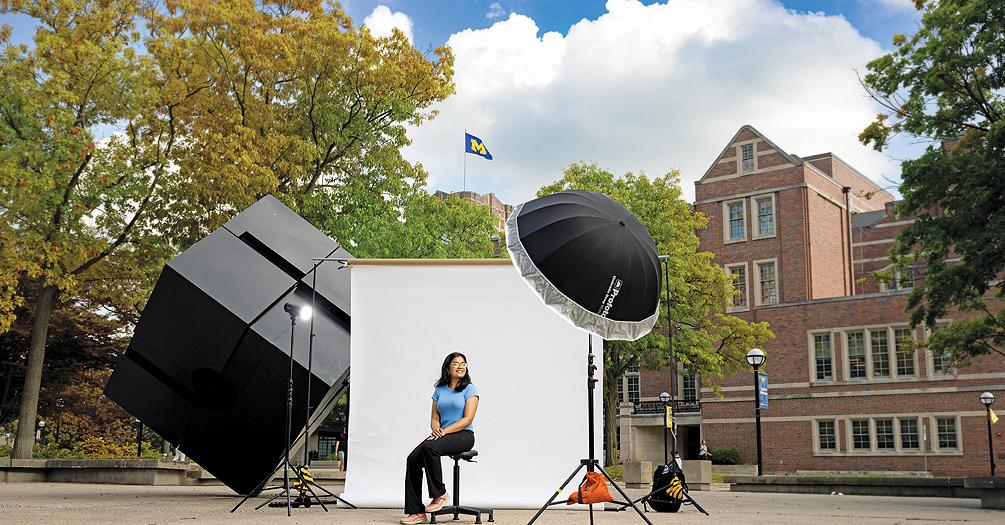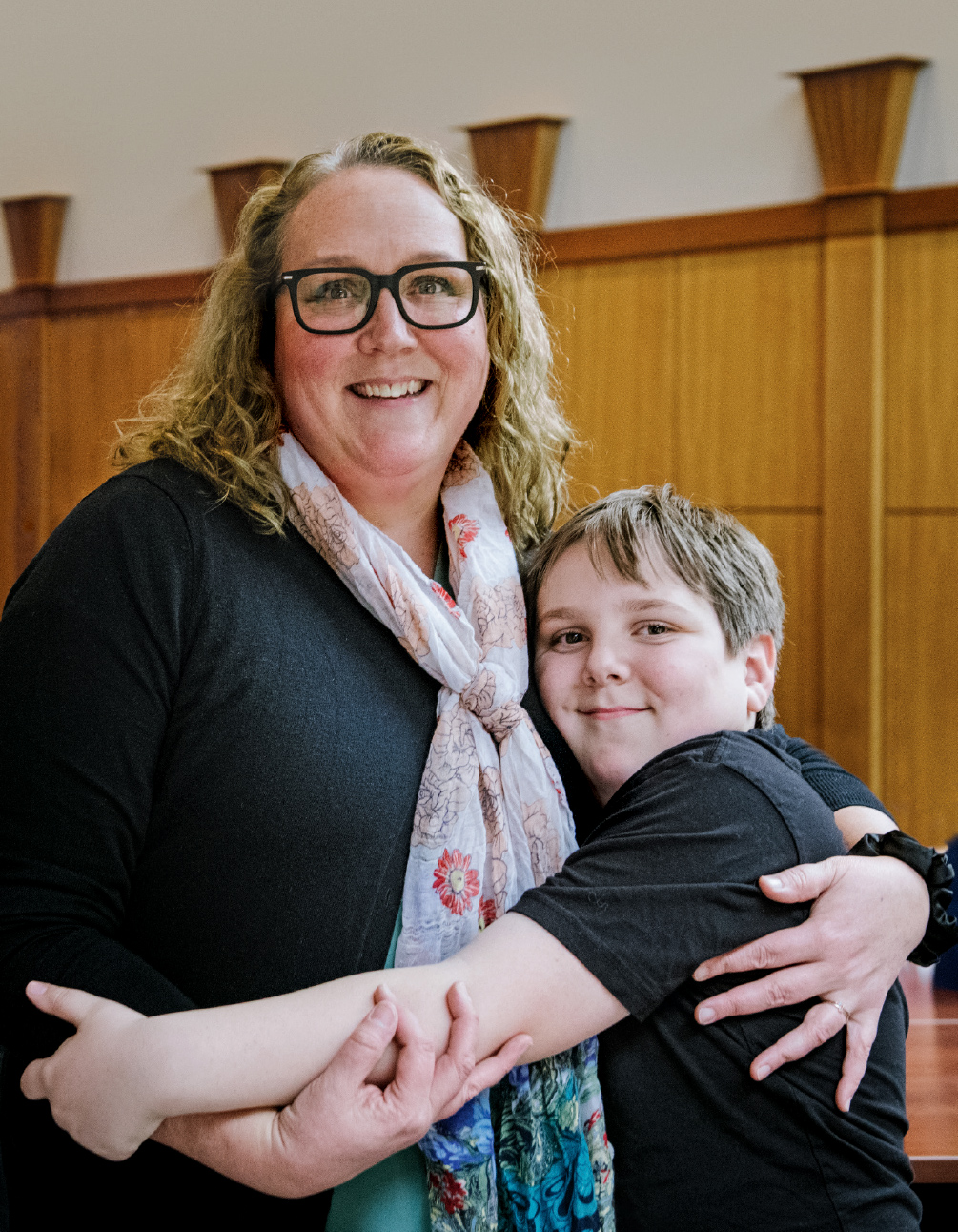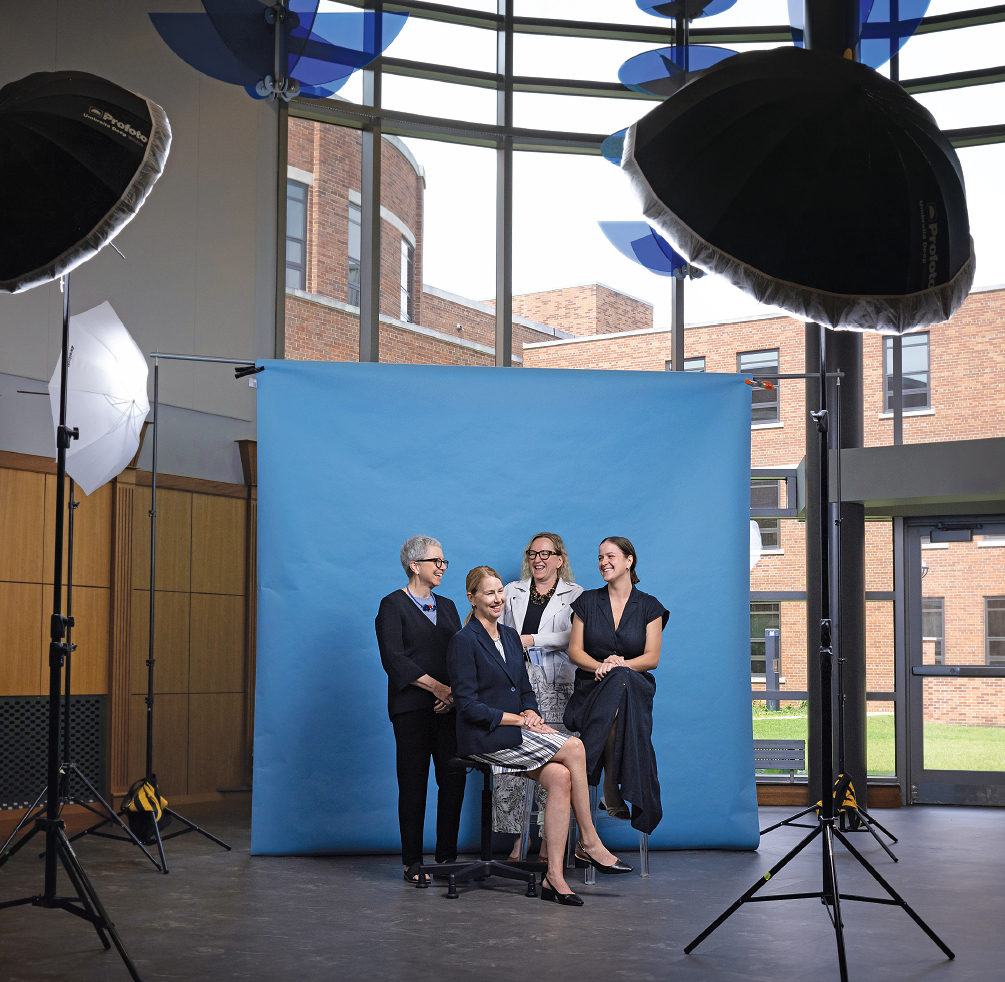Inspiring creative solutions

Michigan Health Equity Challenge encourages student, community-led approaches to health disparities
By Destiny Cook
Initiated by Michigan Public Health, the MolinaCares Accord and Molina Healthcare of Michigan, the Michigan Health Equity Challenge fosters innovative solutions to health inequities.
Launched in Fall 2023, the challenge engages graduate students across the university in working with community-based organizations to develop impactful proposals aimed at improving health outcomes in the state.
Earlier this year, two projects were recognized as the Michigan Health Equity Challenge’s inaugural winners. Their work aims to address health equity in innovative ways, focusing on neurodivergent individuals’ reproductive care and intimate partner violence (IPV). The challenge embodies what the future of healthcare can look like with the marriage of innovation and inclusivity.
Winners address reproductive healthcare, intimate partner violence
Melissa Zochowski, a PhD candidate in the Health Infrastructures and Learning Systems program at the University of Michigan Medical School, partnered with Planned Parenthood of Michigan to develop the Holistic Opportunities for Patient Equity (HOPE) intervention. This clinical initiative is tailored to improve reproductive healthcare outcomes for neurodivergent individuals by educating and training healthcare providers based on insights from patient-reported needs.
PROSPECTIVE STUDENT? Learn more about Michigan Public Health.

“I have worked for many years in sexual and reproductive health research and program management,” Zochowski said. “The challenge was an opportunity to propose something that combined my doctoral program training on improving healthcare delivery with my background in reproductive health research and my firsthand experience of seeking neurodiversity-affirming care for members of my family.
“Known for the progressive implementation of health services for underserved populations, Planned Parenthood of Michigan was a natural choice as a community partner. My intervention ideas aligned well with a focus on health equity activities already underway at Planned Parenthood, and they’ve been incredibly supportive. What started as a simple idea late one night has evolved into something incredibly impactful that has the potential to improve health outcomes for countless individuals.”
Mehak Bhansali, a Master of Public Health student in Health Management & Policy at Michigan Public Health, partnered with the Michigan Coalition to End Domestic and Sexual Violence to create a mobile app that serves as a comprehensive IPV resource toolkit. The app categorizes resources into five IPV-centric pillars:
- Law
- Finance
- Food, clothing and shelter
- Children
- Mental health
Bhansali’s project aims to bridge the gap in IPV resources, providing inclusive and timely support to survivors across Michigan.
“Addressing IPV is a priority for Michigan, as it remains a pervasive public health crisis that disproportionately affects women and marginalized communities,” she said. “This specialized IPV app will address the pressing need for increased awareness and improved access to resources for survivors. By combining the advantages of inclusive, trauma-informed resources with a targeted specificity, this app will reduce access barriers and ease feelings of being overwhelmed for users.”
Addressing IPV (intimate partner violence) is a priority for Michigan, as it remains a pervasive public health crisis that disproportionately affects women and marginalized communities.”
— Mehak Bhansali
Building a framework for success
The Michigan Health Equity Challenge, supported by a $100,000 grant from the MolinaCares Accord and Molina Healthcare of Michigan, is a testament to the University of Michigan School of Public Health’s commitment to addressing health disparities. Proposals submitted to the challenge reflect the longstanding emphasis on collaboration between University of Michigan students and community-based organizations and addressed a wide range of health equity issues—from reproductive healthcare to housing, clinical trials enrollment, and mental healthcare for children.

Eighteen of the 19 schools and colleges at the University of Michigan were represented in proposal submissions. Ten proposals were selected in December 2023 to receive a $2,000 award and policy/program mentorship over eight weeks during the winter academic semester. Following deliberation by an independent selection committee, Zochowski and Bhansali’s proposals were chosen for an additional $1,000 award, with their partner organizations receiving grants of up to $50,000 to implement the ideas.
The Griffith Leadership Center, housed within the school’s Department of Health Management & Policy, played a pivotal role in the challenge’s establishment and ongoing success. Spearheaded by Griffith Leadership Center executive director Cathy Killaly, MHSA ’97, the center managed the application, mentorship and award processes. Michigan Public Health alumnae Aida Mustafa, MHSA ’19, and Graceanne Horton, MPH ’23, were instrumental in managing day-to-day operations and activities.
Linking the formidable resources of MolinaCares with the University of Michigan’s legacy of public health leadership heralds a new era of transformative action.”
— Terrisca Des Jardins, MHSA ’00, plan president of Molina Healthcare of Michigan
“The power to uproot health disparities begins with fresh ideas and a dedicated space to nurture them,” Killaly said. “The challenge aims to harness creative thinkers and develop leaders by strengthening connections among research, teaching and practice.”
The conversation to bring a health equity challenge to the University of Michigan began in April 2023 with a discussion between Killaly and Terrisca Des Jardins, MHSA ’00. After years of engagement with the school, Des Jardins, plan president of Molina Healthcare of Michigan, saw the university’s potential to spearhead a vibrant ecosystem of health equity-driven innovation.
“Linking the formidable resources of MolinaCares with the University of Michigan’s legacy of public health leadership heralds a new era of transformative action,” Des Jardins said. “Coupled with the success we saw from the first Health Equity Challenge at UCLA, it made absolute sense to bring the initiative to the Leaders and Best.”
SUPPORT research and engaged learning at Michigan Public Health.
The teams from the Griffith Leadership Center, the MolinaCares Accord and Molina Healthcare of Michigan are excited to see what new ideas the University of Michigan graduate students bring to the challenge. This year, the Michigan Health Equity Challenge will be expanded to include graduate students from the University of Michigan’s Dearborn and Flint campuses. Additional funding from the MolinaCares Accord and Molina Healthcare of Michigan will also expand the number of challenge winners from two to three.
The Michigan Health Equity Challenge is fostering collaborative environments in pursuit of health equity for all. The work of the 10 finalists and challenge winners Zochowski and Bhansali—who are now embarking on the implementation of their proposals—highlights the need for a diverse group of voices and ideas to tackle health inequities across the large landscape of health and well-being.

